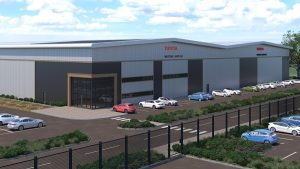Fastest growing company in the East Midlands revealed

Kirkby in Ashfield-based Collins Earthworks has been named the fastest growing business in the East Midlands in an influential report.
Grant Thornton’s East Midlands Top 200 Report, produced in conjunction with the CBI, shows that the region’s businesses have grown profits by an average 30% and employment by 39% over the last three years.
The Report ranks businesses by the percentage growth in profitability over the last three years and includes both established and up-and-coming businesses.
For the third year running, Nottinghamshire has the highest representation on the list of any county, with 58 businesses featured, which together have an average adjusted profit growth rate of 33.7%, have grown employment by 16%, and provide almost 19,000 jobs.
Four Nottinghamshire companies take top 10 slots, with Kirkby-in-Ashfield private business Collins Earthworks taking the number one slot for profit growth, and RH Developments in second place, Van Elle in fifth and The Mellors Group at number nine.
All 200 businesses on the 2017 list and the Report’s full findings were unveiled at a series of breakfast events across the region, and show a combined annual turnover of £15.9bn, operating profit of £1.5bn, almost 100,000 employees and an average operating profit margin of 9.50%.
Whilst Nottinghamshire has 58 businesses on the list, it is closely followed by Leicestershire with 57 businesses, Derbyshire with 48 businesses, and Lincolnshire with 37 businesses.
Leicester and Leicestershire is the largest economy represented in the report (measured by turnover), and their 57 businesses in the Top 200 have a combined average adjusted profit growth rate of 27.6%, and have grown employment by 48%. Taking places in the top ten are Leicestershire businesses F Sherwood & Sons (third), Morningside Pharmaceuticals (fourth), and Davidsons/Go Plant (eighth).
Derbyshire businesses in the list’s top 10 are Motorpoint (sixth), M Markovitz (seventh), and A.B. produce (tenth). Manufacturing is the most significant sector in Derbyshire, with 18 manufacturing and/or engineering businesses on the list. The county also has the lowest debt at £238m, and the highest average salary cost of £27,700.
Data for Lincolnshire reveals the county’s fastest growing businesses are investing heavily in R&D, potentially down to its strong agricultural and manufacturing heritage, and the county’s businesses have an average adjusted profit growth rate of 25%. Gelder Group Holdings is ranked number 21 on the list, making it the highest placed Lincolnshire company this year.
Mark Pashley, director at Grant Thornton’s East Midlands regional office, presented the report’s findings and said: “Given the tight criteria for sustained profit growth required for companies to be included on the East Midlands Top 200 Report, it is testament to the strength of the regional economy that so many companies qualified. The detailed analysis uniquely ranks businesses based on their profit growth over a three-year period – from 2013 to 2016 for this year’s report – to give us the most insightful snapshot of the health of the East Midlands’ economy.
“In the three-year period covered by the 2017 report, it is clear businesses in the East Midlands continue to experience a healthy and robust trading environment. Indeed, there are two businesses that have been on the Report every year since its launch, meaning they have grown profits for a sustained eight-year period.
“It is interesting that the services sector is the largest and top performing sector by profit growth this year, with 62 service companies from the IT/software, legal, recruitment, financial, real estate, banks, travel and tourism sectors listed; the sector has performed significantly better than in previous years. With 51 companies on the list, manufacturing is the second largest sector this year, and property and construction takes third place with 31 companies.”
He added: “The Report shows that East Midlands’ businesses are performing well and operating profitably, and whilst we wait to see the impact of the General Election and Brexit, the region’s businesses enter this next phase from a position of solid performance and businesses viability.”
The 2017 Report shows a stark difference in the amount of cash reserves for the East Midlands’ top 200 businesses between the opening and closing periods: despite a nearly 13% increase in debt, the net debt position shows that companies appear to be storing cash on the balance sheet and not spending or investing, perhaps signalling some nervousness over the future, maybe due to Brexit or a more general lack of incentive to invest.
Of the 200 businesses on this year’s report, just over three-quarters (77%) are mid-sized and 23% are large businesses.
“The range, sector and size of all 200 companies illustrate the East Midlands’ impressive economic and market diversity, which plays a significant role in its overall performance, durability and sustainability,” added Mark.









